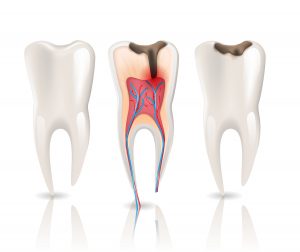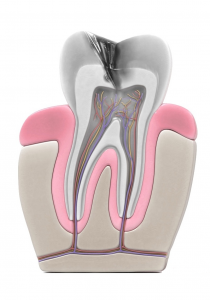6 Signs That You Need a Root Canal
Do you have pain when biting down or sensitivity to cold liquids? You may need a root canal to help save your tooth and avoid expensive implants. It is important to have an evaluation by your dentist, but there are 6 signs that you may need a root canal.
6 Signs That You May Need a Root Canal
Not all teeth that require root canal therapy are painful, however, signs you may need a root canal include:
 Severe Toothache without Provocation
Severe Toothache without Provocation
Constant pain that is not stimulated by temperature changes or chewing can indicate tooth nerve infection.
Swelling or Tenderness in the Nearby Gums
If your gums are painful and swollen, this may be an indication that infection is leaking from inside your tooth. The leaking infection can cause infection and inflammation in the nearby gum tissue.
Biting or Chewing Pain
A cracked tooth that allows bacteria into your tooth may cause pain when biting down or chewing. Additionally, an abscess can cause tenderness in the surrounding bone.Dark Discoloration
Tooth discoloration, gray or black appearance of the tooth, could indicate an infection inside your tooth. If this is the case, root canal treatment is required to treat the underlying infection and internal tooth bleaching may be required to restore your original tooth color.
Increased Painful Response to Hot and Cold Temperatures
Hot and cold foods can cause an abnormal strong pain in an infected tooth. Tooth nerves become hypersensitive to stimulation.
Lingering Cold Sensitivity
Lingering sensitivity to hot or cold food may be a sign of needing a root canal. Infected nerve tissue no longer functions normally.Causes of Tooth Pain

The 6 signs that you need a root canal can also help indicate the source of your pain. Tooth pain can be divided into two groups: the nerves on the interior of the tooth and the nerves exterior to the tooth in the surrounding bone and ligament. A severe aching tooth ache without provocation, Dark coloration of the tooth, pain in response to temperature and prolonged sensitivity are all indications of a dying nerve on the interior of the tooth.
Initially, your tooth may be sensitive to cold but as the nerve damage progresses deeper into the nerve, your tooth may become more sensitive to heat. Eventually, your own body temperature may be enough to cause tooth discomfort, which would explain why you may have a severely aching tooth without provocation. A dark discoloration of the tooth may indicate severe caries or a discoloration due to internal tissue breakdown. Removing the nerve tissue is the most effective way of relieving nerve pain.
Pain while chewing or swelling and tenderness in nearby gums indicate that the inflammation and swelling is no longer isolated to the nerve tissue. Antibiotics are the most effective way of resolving the inflammation and swelling of tissues surrounding the tooth.
Tooth Pain that Mimics the Need for a Root Canal
Dental Sensitivity. Not all dental sensitivity warrants being treated by a root canal. Dental sensitivity can be caused by worn enamel from brushing with a hard tooth brush, worn dental fillings or tooth erosion due to acidic foods. There are many over the counter remedies that may alleviate your symptoms and help avoid the need for a root canal.
Tooth Decay and Broken Teeth. Tooth decay and broken teeth can expose the dentin underneath the enamel. This can cause sensitivity to cold liquids. Removal of the decay and restoration with a protective filling can alleviate your painful symptoms and avoid the need for a root canal.
Tooth Grinding. Grinding your tooth at night can traumatize your teeth and cause your facial muscles to ache. Muscle ache can mimics the need for a root canal and patient's often have difficulty pinpointing the location of the pain. Muscle relaxers and night guards can alleviate your pain.
If you experience any of these symptoms, contact Creekside Endodontics in Lone Tree, Colorado at (303) 524-9343. Dr. Stubbs and his caring staff can help relieve your pain and return to your regular, healthy lifestyle.